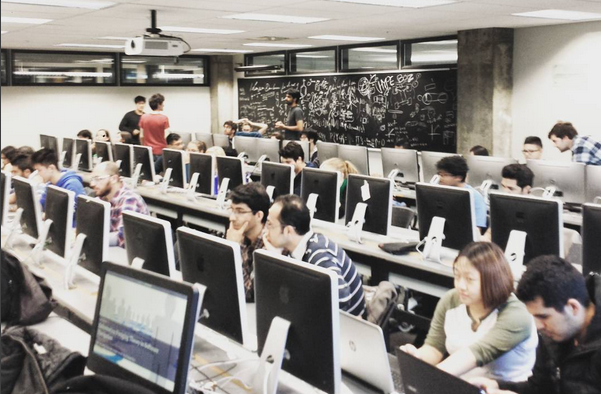On Sept. 30, HackMcGill hosted its second Learn to Code event at the Lorne Trottier Building. Created for McGill students unfamiliar with the programming world, Learn to Code offers newcomers help from those with experience.
Following a brief introduction about the types of programming languages and a list of the web tutorials that the participants could use during the event, the students began to work on their computers. During the event, the 30 or so students in attendance were able to learn the ins and outs of programming with HackMcGill executives readily available to answer questions. Tutorials featured help on Python, Ruby, HTML/CSS, Java, Haskell, and OCaml.
“A lot of people want to learn how to program, but the sheer volume of information out there can be overwhelming for a beginner,” explained Clare Lyle, Director at HackMcGill. “Learn to Code is a way [to make] the abundance of information accessible. Having someone on hand to ask for help when you get stuck can help beginners gain momentum and get past the initial ‘I have no idea what any of this means’ phase.”
This sentiment was the driving force behind the creation of HackMcGill. Created by two McGill computer science students who wanted to make programming fun and less intimidating to the average person, HackMcGill is a unique outlet at McGill for all students.
“It’s a community of computer programming enthusiasts who get together and just have fun with coding,” Amiel Kollek, co-president of HackMcGill, said.
Ensuring students can both learn and have fun often means bypassing a lot of the intimidating information that many professors teach in their beginner courses.
“If you just want to make your own website or app, comp classes won’t always help,” explained Kollek.
Down the road, concepts like algorithms and data structures are important for understanding certain processes, but not necessary from the beginning
“It’s really hard to learn to code in class,” Berke Yanilmaz, a U0 Science who attended the event, explained. “You can get the theory in class but it is really hard to put in practice once you are all alone.”
With events like Learn to Code, HackMcGill is aiming towards changing the way coding is perceived by the general public.
“People who come to our events come from all kinds of backgrounds,” said Michael Noseworthy, another Director at HackMcGill. “There are people who have never coded before to people who are computer science majors.”
Already, more and more web and app development is done by teams, but most novice coding is done alone, meaning it’s hard to get answers and find like-minded people to help out.
“We also wanted to add a more social aspect to coding, which is usually considered to be pretty solitary,” said Lyle. “We wanted to get people coding with their friends, asking each other questions, and building a community geared towards learning.”
Fostering a relaxed learning environment at these events not only helps build a community, but attracts people to the field.
“I got into computer science because I went to an event like this when I was in U0,” said Kollek.
This attitude continues to attract students to HackMcGill events today.
Since its inception, HackMcGill has garnered a lot of popularity and is now responsible for hosting a number of different coding-related events. For those with experience in the programming world, HackMcGill hosts events such as Hack101 and McHacks. Whatever level a student may be, HackMcGill aims to help.
Full disclosure: Clare Lyle is a contributor for the McGill Tribune.







